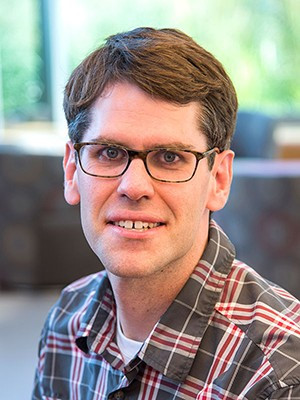
Steven Henle

Steven Henle
- Chair, Neuroscience Department; Assistant Professor of Neuroscience
After training at St. John’s University, the Mayo Clinic, Harvard Medical School, and the Medical College of Wisconsin Professor Steven Henle joined the Carthage faculty first as an adjunct professor in 2016, and then as a full-time assistant professor in neuroscience in 2018. His academic interests span from molecules to brains. Because of this background, Prof. Henle teaches in both neuroscience and biology. He also conducts research with undergraduates from both majors trying to understand development and regeneration of the zebrafish eye. These projects use a combination of biochemical, cellular, and behavioral assays.
Prof. Henle has presented his work at large and small conference across the US, as well as Italy and Japan. Traveling has been and eye-opening experience for him, and he hopes in the future to lead student study tours as well.
- B.A. — Biochemistry, St. John’s University (MN)
- Ph.D. — Biomedical Sciences-Molecular Neuroscience, Mayo Graduate School
- Postdoctoral Fellowship — Neurobiology, Harvard Medical School
- Postdoctoral Fellowship — Neuroscience, Medical College of Wisconsin
- BIO 1110 Molecules, Cells, and Organisms
- NEU 2100 Introduction to Behavioral Neuroscience
- NEU 4000 Senior Thesis in Neuroscience
- NEU 4900 Research in Neuroscience
The desire to understand what makes you think at the level of cells and molecules is what drove me to got into science. After a lot of training, I am closer, but still have a long way to go. I am continuing this pursuit at Carthage. In particular, I focus on neurodevelopment of the zebrafish eye, hoping that in this relatively simple system, I can understand the process by which neurons are made, wire correctly, and become functional. Additionally, I am looking at ways to promote regeneration of our nervous system after injury.
Patricia Kern Predoctoral Fellowship NIH T32 — Postdoctoral training grant trainee NIH F32 — Postdoctoral Fellowship NIH K99/R00 — Pathway to Independence Award
Henle SJ and Link BA. Producing tissue specific stem cells for regeneration: how YAP/TAZ may prove useful. Stem Cell Investig. (2017). editorial Krol A, Henle SJ, and Goodrich LV. Fat3 and Ena/VASP proteins influence the emergence of asymmetric cell morphology in the developing retina. Development. (2016). Henle SJ, Carlstrom LP, Cheever TR, and Henley JR. Differential role of PTEN in directional guidance of nerve growth cones. J. Biol. Chem. (2013). Chen Z, Lee H, Henle SJ, Cheever TR, Ekker SC, and Henley J. Primary neuron culture for nerve growth and axon guidance studies in zebrafish (Danio rerio). PLoS One. (2013). Hines JH, Henle SJ, Carlstrom LP, Abu-Rub M, & Henley JR. Single vesicle imaging reveals distinct modes of rapid membrane retrieval during nerve growth. BMC Biology. (2012). Carlstrom LP, Hines JH, Henle SJ, Henley JR. Bidirectional remodeling of β1-integrin adhesions during chemotropic regulation of nerve growth. BMC Biology. (2011). Henle SJ, Wang G, Liang E, Wu M, Poo MM, & Henley JR. Asymmetric PI(3,4,5)P3 and Akt signaling mediates chemotaxis of axonal growth cones. J. Neurosci. (2011). [Cover Image]
